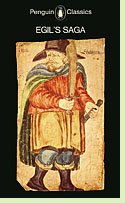Egil's Saga
by Snorri Sturluson
Reviewed by David Maclaine

Egil's Saga offers the deepest insight into the ethos of the Viking Age of any work of fiction I know. Those who believe the anti-hero is a modern concept will be disabused of that notion by this tale, which centers on an ugly, violent man who wins our sympathies, and then repeatedly loses them by his murderous over-reactions. Egil Skallagrimsson is the prototypical rebel, who refuses to bow to the power of his royal adversaries and tends to take what he calls justice into his own hands. If you filmed his story in the 1970s he'd be played by Charles Bronson, in the '90s by Steven Seagal, though it's a stretch to imagine either of those actors playing a scene in which he wins his freedom by composing and reciting finely-crafted poetry. Egil was a gifted artist, as well as a self-centered and violent man: if Norman Mailer had lived in the tenth century he'd have rushed off to hang with him.
Because Egil's Saga follows the conventions of the genre, the story begins with his ancestors - the title character isn't born until fifty pages into the story - and offers some useful background on earlier developments in Norway and Iceland. Egil's adventures also take him more than once to England. As is common in sagas, the plot is episodic and sometimes strays to what we would call secondary characters. The style is clear and uncluttered, and people pause to talk about their more tender feelings a bit less often than in a Hemingway novel. But if you want to understand the world of the deadly men who sailed off to raid and kill, men who were prized both for their strong sword arms and for their ability to spin words into beguiling patterns, it is well worth tackling a few oddities of saga style to get this thirteenth-century view of a Viking "hero" crafted by one of his most gifted descendents. (about 1240 A.D.; the 1977 English-language Penguin edition is 256 pages)
More about Egil's Saga at Powell's Books, Amazon.comEgil's Saga appears on the list of The 45 Best Historical Novels Set in the Viking Age
Other Icelandic sagas:
The Saga of Gunnlaug Serpent-Tongue (circa 1300; author unknown), about a tenth-century Icelandic skald (poet), his rivalry with another skald, and his loss of the woman he loves. Read online at the Icelandic Saga Database; also included in The Sagas of Icelanders.
The Saga of the People of Laxardal (13th century; author unknown), about Ketill Flatnose and his descendants, especially his daughter Unn the Deep-Minded. See review or read online at the Icelandic Saga Database. This saga is also included in The Sagas of Icelanders.
Gisli Sursson's Saga (late 13th or early 14th century; author unknown), about a migrant from Norway to Iceland and the tragic fate that entangles him, his brother, and his two brothers-in-law. Read online at the Icelandic Saga Database; also included in The Sagas of Icelanders.
Nonfiction about Viking-Age Iceland:
Iceland: Land of the Sagas by David Roberts with photography by Jon Krakauer (1990), about the authors' travels in Iceland and the history of Iceland, especially the period when the Viking-Age sagas were written. More info
Viking-Age Iceland by Jesse L. Byock (2001). More info
Icelanders in the Viking Age: The People of the Sagas by William R. Short (2010). More info
Online:
Egil Skallagrimsson and the Viking Ideal, an article by Christina von Nolcken at the University of Chicago website
Back to Novels of the Medieval Vikings
Back to Directory of Book Reviews